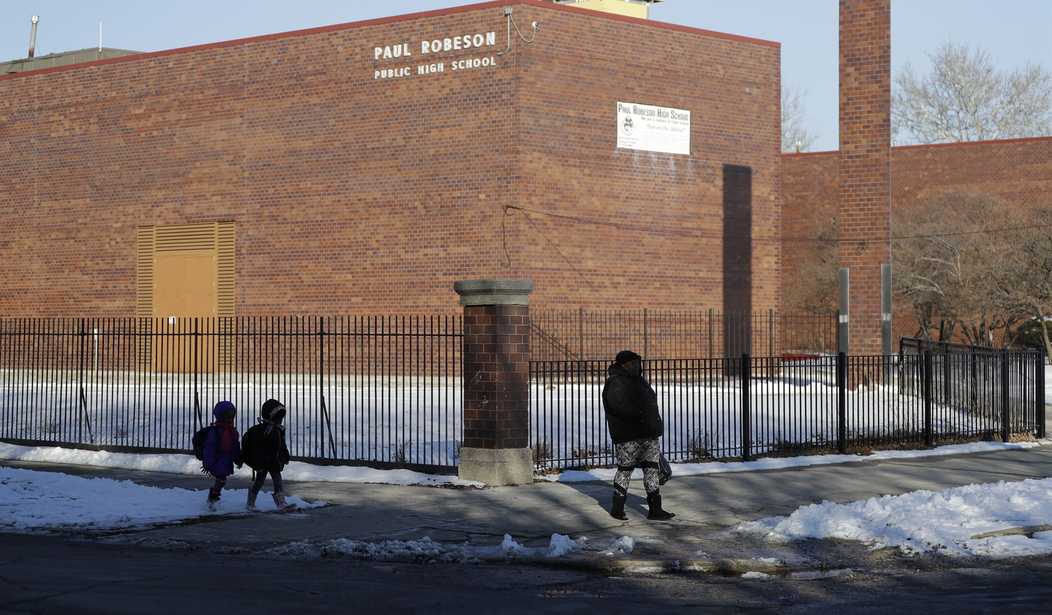While legislators in states like Idaho, Iowa, and West Virginia are taking steps to ensure that any would-be mass murderer targeting a school will be met with an immediate armed response from trained and vetted school staff, anti-gunners in Chicago, Illinois are pushing a very different approach to school safety.
Since the start of the year at least four Chicago teenagers have been murdered just off of school grounds, and several of those homicides were allegedly sparked by beefs that started on campus before spilling onto the streets. Chicago Mayor Brandon Johnson is actually talking about taking Chicago police officers out of schools, which seems like an incredibly bad idea to me, but the stupidity is compounded by Barack Obama’s former Education Secretary Arne Duncan, who wants to see “violence interrupters” take up shop on campus. Duncan’s plan has received a tentative thumbs up from the editorial board of the Chicago Sun-Times, even though the editors admit the plan might violate state law (not to mention common sense).
The problem is this: Most of the “life coaches” Duncan spoke of have criminal backgrounds, and state law bars people convicted of certain crimes, including drug dealing, from working in schools, as WBEZ’s Sarah Karp reported .
Having ex-offenders in schools isn’t likely to sit well with many parents, and their concerns are legitimate. All it would take is one small incident or miscommunication, and the experiment might blow up.
But high-risk students could benefit from such a resource. If they are unwilling to find help outside school, perhaps they’d be more willing to listen to someone at school, a space where they are five days a week.
“The kids that need the most help are being denied the people who could be the most helpful. So the best resource for them, they are locked away from,” said Duncan, the managing partner of Chicago CRED, an organization that works toward reducing gun violence.
Elected leaders, with the help of violence reduction experts and activists, should at least look into whether it is worth amending the law, with some strict exceptions that would perhaps allow those with less serious criminal records to work with young people at schools, solely for violence intervention work.
Safeguards, such as the presence of a school official at any sort of violence prevention sessions and a ban on interactions with students outside the school without faculty present, would likely have to be in place.
But if lives can be saved and more children will be spared the trauma of losing a classmate, it doesn’t hurt to explore the possibility of allowing students who need help to safely engage with those who, despite their criminal record, know better than most what young people are experiencing in their communities.
The Sun-Times goes on to laughably claim that “right-wing lawmakers unwilling to enact common-sense gun legislation” are to blame for the violence in Chicago, which is nonsense given that Democrats hold all the cards in Springfield and Chicago. Illinois has plenty of gun laws in place, but they’re mostly aimed at lawful gun owners instead of violent criminals.
I’m not opposed to proven violence reduction strategies that don’t involve the use of law enforcement. Still, it’s striking to me that the Sun-Times editors are on board with Duncan’s plan when they’d never endorse having armed school staff on campus to protect the kids in their care. Convicted felons, sure, but concealed carry holders? That’s just crazy talk, at least for the left.
Beyond the glaring double standard on student safety, there’s another big problem with Duncan’s proposal. According to the University of Chicago Crime Lab, fully 90 percent of juvenile victims were not enrolled in school or attending classes when they were assaulted, shot, or killed. The crime lab’s study doesn’t indicate how many juvenile suspects in those crimes were also unenrolled, but given the overlap between victims and offenders, my guess is that the majority of perpetrators aren’t regularly attending class either. Putting violence interrupters in school isn’t just an unproven idea. It sounds like that’s not really where they’re needed.
To be fair, I don’t think that having armed school staff in place would solve this problem either, given how much juvenile crime involves kids who aren’t in school to begin with and the fact that most of the violence is taking place off-campus. Fixing the state’s broken juvenile justice system should be the top priority, closely followed by programs that offer at-risk youth the opportunity to chart a new course in their lives. But if we’re talking about specifically improving the safety of kids who are showing up for class, then armed protection (whether from police, staff, or both) is far more important than installing violence interrupters in Chicago’s public schools.








Join the conversation as a VIP Member